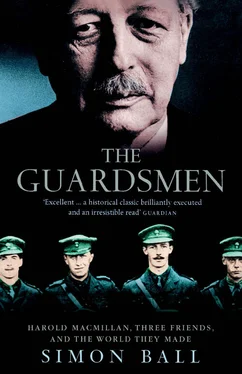Lyttelton had already lost all confidence in the chain of command when he found himself a player in the so-called Hébuterne incident of 26 March 1918. When Ardee was gassed Lyttelton rode over to the Guards Division and tried to place the brigade back under its command. He was reassured to find the divisional staff officer, Ned Grigg, who had joined the second battalion with him as a subaltern in 1915, playing badminton. He greeted the re-establishment of communications with 31st Division and the resumption of the proper chain of command with deep regret. This regret was deepened even further when the brigade received a message from the division that the Germans had broken through to the south of their position. 184 Then communications went dead. Lyttelton and many others feared the worst – a complete collapse of the British line. Other units of the division abandoned their positions and tried to retreat. The next day the Guards Brigade found itself defending the whole divisional front against a German attack. Not only had the original signal been false, but it also turned out that the loss of communications was caused by the incompetence of a staff officer who had felled a tree on to the telephone lines while trying to build a defensive position. 185
When Lyttelton’s brigade was withdrawn from the line on 31 March it had lost 14 officers and 372 men. ‘We had,’ Lyttelton wrote, ‘emerged from the battle with little confidence in the command and still less the staff of our new Division.’ As usual, however, the Guards were proud of their own performance. They were soon in ‘good trim’ under a new commanding officer, Brigadier Butler. ‘That’s that,’ was Lyttelton’s feeling. 186 Unfortunately the Germans had merely shifted the attack further north. On 9 April they carefully picked a weak point in the line held by Portuguese troops and drove straight through them deep into the British line.
Instead of being able to lick its wounds, the Guards Brigade was thrown back into the fighting in a desperate defence. In the words of Rudyard Kipling, the Guards were sent to ‘discover and fill the nearest or widest gap…to get in touch with the Divisions on their left and right, whose present whereabouts were rather doubtful’. Lyttelton thus found himself back where he had begun his military career near Festubert. As brigade major, he was supposed to be at the hub of information coming into brigade headquarters and orders being issued from it. But he had little information and that which he did receive was nearly always wrong. On 12 April the brigade was ordered to advance in search of friendly troops. As soon as they moved off they were caught in a vicious crossfire from enemy troops waiting for them with rifles, machine-guns, mortars and field guns operating at close range. At 4.30 p.m. the Germans attacked in force. Desperately, the Guards fought them off. Butler and Lyttelton signalled the division that they could not hold another attack on such a wide front. They believed they had been informed that another division would send troops to take over part of their line. But no troops arrived.
When the Germans came on again at 6.30 the next morning it was war to the knife – German troops masqueraded as Grenadiers so as to get close to the British lines before opening fire. Lyttelton later called this a ‘soldier’s battle,’ but the reality was much grimmer. 187 The Guards were isolated and being wiped out piecemeal. Companies were cut off from each other in their own pockets and fighting the best they could. At 3.30 p.m. the commander of the Grenadier company on the far left flank managed to get a message through that he was surrounded. Brigade HQ ordered the Irish Guards to send a company to try and rescue him: only one NCO and six men survived the ensuing massacre. The Grenadiers fought and died where they stood. Lyttelton later said that when their leader, Captain Pryce, who was awarded a posthumous VC, had less than ten men left he charged the enemy. By the time the Guards were rescued by Australian troops late in the afternoon, the brigade had been shattered. In two days of fighting it had lost 39 officers and 1,244 men. The butcher’s bill was worse than the Somme. 188
It was perhaps ironic that, having survived this maelstrom intact, Lyttelton was gassed a few days later while sitting at his table writing. A shell-burst spattered him with liquid mustard gas. His scrotum, penis and thighs were severely burned, his lungs were damaged and he was blinded. 189 Like Macmillan and Crookshank before him, he returned to his mother and a private hospital. 190 He made, however, a near-miraculous recovery. 191 There was no long-term damage and he was even able to return to the Guards Division in time for the final advance and the occupation of Germany.
As Lyttelton was shipped home to England, Cranborne was finally making his way back to France. He went out as ADC to an old comrade-in-arms of his father, General Sir Walter Congreve, who had won a VC in the Boer War. 192 General Congreve had unfortunately not shown up too well in the March débâcle. He was described as ‘absolutely down and out and incapable of any clear thinking’. His chief of staff, another VC, with whom Cranborne was supposed to work, was, in the words of an old friend, ‘a monstrous appointment’ who had ‘failed to pass into the Army through any orthodox channel…with a minimum of intellect…cool and collected, but had not the slightest idea of what was going on’. 193 Since they were likely to be dégommé, limogé, stellenbosched – the army had any number of loan words for sacked – Cranborne moved rapidly on, ending up as ADC to the GOC XXII Corps, Alix Godley. 194 There had been plenty of other options. Lord Derby was willing to take him to Paris; Douglas Haig wanted him at GHQ. 195 He discovered, as he told Macmillan, that the war could even be ‘pleasant’. 196
Cranborne’s war ended in October 1918 when a bout of sickness forced him to give up his staff job and return to London. 197 Crookshank’s war ended in June 1918, his Balkan mission completed, standing on Victoria station in the rain. 198 At the time of the Armistice Macmillan was still in hospital. Only Lyttelton saw it through to the bitter end. He finished the war in France as Boy Brooke’s brigade major in the 2nd Guards Brigade. 199 Each of the quartet had experienced ‘the pity of war distilled’. The war had not, however, changed either their personalities or their world view. In each the effect of being a combatant was rather to magnify existing personality traits.
The war touched Cranborne least. He saw the least service, he made a conventional marriage, he fathered a son during the war. Two factors were now to play a major role in his future. The first was the family project. This was unaltered by the war. His grandfather had intended to found a dynasty that would add political power to its wealth and social status. His father, though by temperament ill-equipped to further this project, had nevertheless tried his best to do so. His uncles and his mother were even keener that it should continue. Neither before nor after the war did Cranborne show any sign of kicking against the traces. He embraced his destiny as an ineluctable duty, though in this he suffered a severe impediment. He had inherited his father’s weak constitution. The war exacerbated his medical problems. His health first broke down in 1915 after a few weeks’ service on the Western Front. He then spent most of the war on sick leave or light duties. He even had to return home from his staff duties in 1918 because of a renewed bout of illness. Yet these chronic illnesses would have affected him whether or not he had fought. Crookshank and Macmillan had serious health problems for the rest of their lives as a direct result of their war wounds. Cranborne’s most debilitating post-war illness was the polio that struck him some years after the end of the war in the 1920s. 200
Читать дальше












